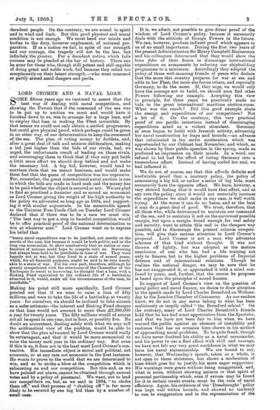TOPICS OF THE DAY.
PANIC-MONGERS AND SECURITY-MONGERS. THE preaching of moderation is never a very easy, and almost always a thankless, task, but it is never more difficult, though also never more necessary, than when one set of extremists is vehemently calling out that the country is going to the dogs and that the national spirit is degenerating, while the other, in equally shrill tones, is flinging broadcast accusations of scare-mongering and panic-mongering, and imploring the country to sleep in security and to return to its good old John Bull habit of "pot-bellied equanimity." When the public mind is distracted by the outcries of these two schools of thought., those who, like ourselves, are anxious about the condition of the nation, and determined, if they can, to awaken it to a true sense of its situation, but who know at the same time that the heart of the people is sound and that there is no national decadence, are apt to get blows from both sides. The pessimists insist that we are not whole-hearted in our expressions of anxiety, while the optimists are shocked because we will not repeat the parrot-cry that the nation has been through worse storms before, and will no doubt weather this one if it will only adopt the brave and large-minded policy of shouting that there is no danger and no difficulty and that all is for the best.
In spite of the risk of being told that we are trying to "have it both ways," and that we are persisting in our wretched Whig habits even when the nation is in danger, we should like to set forth some of the considerations which make us intensely anxious about the national situa- tion. We must begin, however, by saying that we have no sympathy whatever with the lyrical pessimism of Mr. Kipling, whose poem in the Morning Post of Monday seems to us wholly out of focus. It is as little representative of the national spirit as are the diatribes of those Radicals and Socialists who, while they differ from Mr. Kipling in everything else, axe inclined to join with him in repre- senting their country as composed chiefly of selfish moneymakers or even more selfish pleasure-seekers. As we have said again and again in the Spectator, the trouble is not here. The nation is, we believe, sounder at heart, and sounder even in thew and sinew, than it has ever been before in its history. Those who assert that as a nation we are degenerating either in mind or body know very little of the history of their country. It is true that there is very much that is bad in the state of the nation. Physically and morally "we do not as we ought ; what we ought not, we do." None the less, if we make a just comparison between the conditions prevailing now and those prevailing at any former time in our history, we believe the comparison will be in favour of to-day. ,What it is necessary to convince the nation of is not that it is going downhill, but that the present comparatively sound condition of our people, and the general high tone and rectitude of intention displayed by their rulers in both parties, are not enough to save us from grave peril, and will not save us, and that to make ourselves secure under existing conditions we must do a great deal more, and make many more sacrifices than have ever before been called for in our national history. As our correspondent "II. G-." in effect points out in a letter which, if a little too pessimistic in tone, is thoroughly sound in spirit, our people are in danger because they are not showing that power of adapting themselves to their environment which is as essential to the survival of nations as of animal types. The old life was a good life and a sound life in many ways, but we are trying to live it in a new world and under new conditions. Here is the peril. However unpleasant it may be for those who hold with us to be called "scaremongers," "pedants in a panic," or "persons incapable of realising the noble nature of our people," it is absolutely necessary for us to run the risk of such misrepresentation, and to point out that the good qualities of nations have not in the past saved them from destruction, and will not save them in the future unless they are capable of adapting themselves to new conditions and of making the appropriate sacrifices and renunciations.
For our people the period of transition, the period in which a change of national attitude becomes imperatively necessary, is bound to be one of special danger, because our natioual weakness, as also our national strength, consists in a certain stubborn equanimity,—an unwilling- ness to make a change, or to "get in a fuss," or to admit that the old ways are not good ways, and not perfectly suited to these times and all times. The Briton's horror of what he calls panic is an excellent thing in itself, but it may easily be carried to a point where it becomes a kind of wooden insensibility. There is nothing more admirable than the spectacle of a man keeping quite cool while his house is tumbling about his ears, but when that attitude of coolness degenerates into a kind of idolatry it ceases to be worthy. As a nation we are apt to do what all idolaters do,—to keep the material and physical phenomena of religion without the spirit which should inform it. The wise man keeps cool in .a moment of peril and shows no nervous rapidity in his movements, and even apparently no consciousness of his peril, not because that attitude is per se better than any other, but because it is one which will best enable him to decide how to avoid danger, best enable him to spring in the right direction and keep clear of the falling beams. Mere coolness and slowness of action in the face of moral or physical peril may, if exhibited as it were for " show" purposes, and as a matter of pride rather than of wise expediency, become a positive danger. There are moments when an alert appreciation of danger and a prompt resolve to escape from it are far better than conventionalised coolness, and when a wise "panic-mongering" may become an act of national duty.
Of one thing we are sure. No nation is really decadent in which a large number of its best citizens show anxiety about the state of the country, and warn their fellows of the necessity of care and preparation. The moment for the friends of a nation to despair is not when there is any- thing in the nation which can be called panic-mongering or scare-mongering, but when the national atmosphere is surcharged with complacency, and when a mechanical optimism rules every field of activity. Though we are far from saying that a nation is safe merely because it is alarmed, we aro confident that the worst symptom of national decadence is a fatuous impenetrability to the sense of danger, and the belief that all is well, and must always be well, with the State. The doomed nation is the nation which feels no pain and no anxiety. Just as insensibility to pain and a kind of hectic optimism are regarded by medical men as bad signs in a patient, so national insensibility is a sign of national. ill-health. When the Republics of Venice and of Holland had become decadent at the end of the eighteenth century, the people of those States were for the most part unconscious of what had happened. Their hearts were stone, and so they could not thrive. Those who controlled the State, as well as the mass of the people, showed no signs of anxiety. The streets were not filled with Cassandras prophesying evil, but with citizens who amused themselves or who made money oblivious of the fate before them. When a nation has plenty of "croakers," plenty of people who are keenly sensitive to and vigilant of any symptom of national ill-health, that nation, though it may perish by some accidental blow or by some change in the great wheel of circumstance, will not perish from atrophy.
But though we say this, we must hasten to point out that the mere fact of pessimism must not be turned into what we may term an astringent soothing-syrup. Cassandras may be useful, but a nation which prided itself on its Cassandras but yet paid no attention to their warnings would have given the best possible proof of decadence. The ability to feel physical pain and anxiety is not in itself a bad symptom. In fact, it shows that those useful things, the danger-signals, are working well, and being noted. But the nation which does not attend to the danger-signals, but simply prides itself upon their good working, has lost its head. Reckless engine-drivers are sometimes said, when they see signals against them which they believe are not really important, to " whistle them off,"—i.e., to run past them in the confident belief that they need not have been raised. What we want to avoid is our national engine-drivers attempting to "whistle off" the danger-signals.
To sum up, we are not—as the visitors to the Imperial Press Conference found with delight—in any sense a 'decadent people. On the contrary, we are sound in spirit and in wind and limb. But this good physical and moral condition is not enough. We must bend our minds and bodies to the duty, however unpleasant, of national pre- paration. If as a nation welail, in spite of our strength -and our courage, the tragedy will not be the less, but infinitely the greater. For a decadent nation which fails excuses may be pleaded at the bar of history. There can he none for those who, though still-potent and still capable of doing great and noble work, fail because they relied too complacently on their latent strength,—who went unarmed .or partly armed. amid dangers and perils.















































 Previous page
Previous page